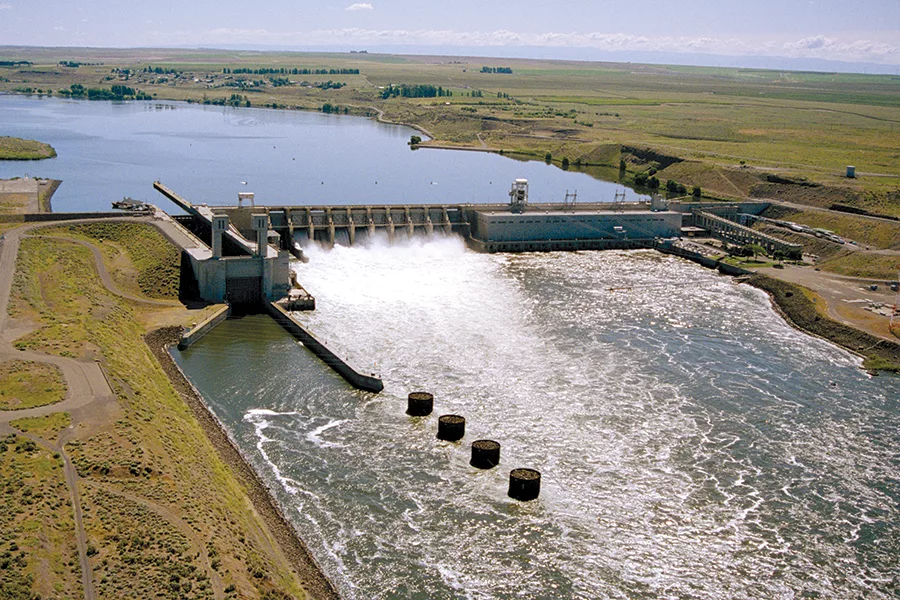
Home » Trump revokes memorandum to study breaching of Snake River dams
Trump revokes memorandum to study breaching of Snake River dams

June 12, 2025
President Donald Trump is directing federal agencies to withdraw from a settlement with tribes and the states of Washington and Oregon that could have led to the breaching of the Snake River dams.
Trump signed a memorandum on June 12 revoking another issued by President Joe Biden in 2023. Biden’s memorandum was part of a settlement, also called the Resilient Columbia Basin Agreement, issued to address concerns by tribal and state officials about the impacts the dams have on salmon and other fish species.
Debate has raged for decades about the fate of the dams — Ice Harbor, Lower Monumental, Little Goose and Lower Granite — on the lower Snake River, which generate electricity and supply irrigation water from their reservoirs but also impact fish populations.
A 2020 study, known as the Columbia River System Operations Final Environmental Impact Statement, implemented a plan to keep the lower Snake River dams in place. That was opposed by environmental and tribal groups. Biden’s memorandum led the U.S. Army Corps of Engineers and U.S. Bureau of Reclamation to announce in December 2024 they would update their study.
Trump’s memorandum states he “recognizes the importance of ensuring the future of wildlife populations in the Columbia River Basin” but that breaching the dams would have had too many detrimental impacts to agriculture, trade, energy and recreation in the region.
“Unlike the previous administration, the Trump Administration understands that policies that promote environmental quality and economic growth are not mutually exclusive,” a release stated.
The document directs the Secretaries of Energy, the Interior and Commerce, as well as the Assistant Secretary of the Army for Civil Works, to withdraw from the settlement. They are then to coordinate with the Council on Environmental Quality to review and revise environmental review processes regarding the dams.
The move was lauded by U.S. Rep. Dan Newhouse, R-Washington, who has pushed for keeping the dams in place.
"Throughout my time in Congress, I have stood firm in my support for the Lower Snake River Dams and the critical role they play in our region’s economy," Newhouse said in a statement. "Today’s action by President Trump reverses the efforts by the Biden administration and extreme environmental activists to remove the dams, which would have threatened the reliability of our power grid, raised energy prices, and decimated our ability to export grain to foreign markets.”
However, pulling out of the settlement is almost certain to restart the litigation that led to it. A statement from Gerald Lewis, tribal council chairman of the Yakama Nation, one of the four tribes who are signatories to the settlement, said he was disappointed in the president's unilateral action.
“The federal government’s historic river management approach is unsustainable and will lead to salmon extinction. Courtroom battles cannot provide the innovative, holistic solutions we need," Lewis said. "This termination will severely disrupt vital fisheries restoration efforts, eliminate certainty for hydro operations, and likely result in increased energy costs and regional instability.”
U.S. Sen. Patty Murray, D-Washington, also criticized the decision as being shortsighted.
“The Resilient Columbia Basin Agreement was the result of years of painstaking work—this was a once-in-a-generation opportunity to modernize infrastructure across the Columbia River Basin, support reliable clean energy, and save imperiled salmon and steelhead runs,” Murray said in a statement. “The Trump administration’s senseless decision to tear it up is a betrayal of our tribes and a tremendous setback for the entire Northwest.”
Jim Matheson, CEO of the National Rural Electric Cooperative Association, stressed the importance of the power the dams generate in supporting Trump’s decision.
“Hydroelectric power is the reason the lights stay on in the region,” Matheson said in a statement. “And as demand for electricity surges across the nation, preserving access to always-available energy resources like hydropower is absolutely crucial. We appreciate the administration’s continuing commitment to smart energy policies and unleashing American energy.”
Latest News Local News Agriculture Energy Environment
KEYWORDS June 2025
Related Articles
Related Products





